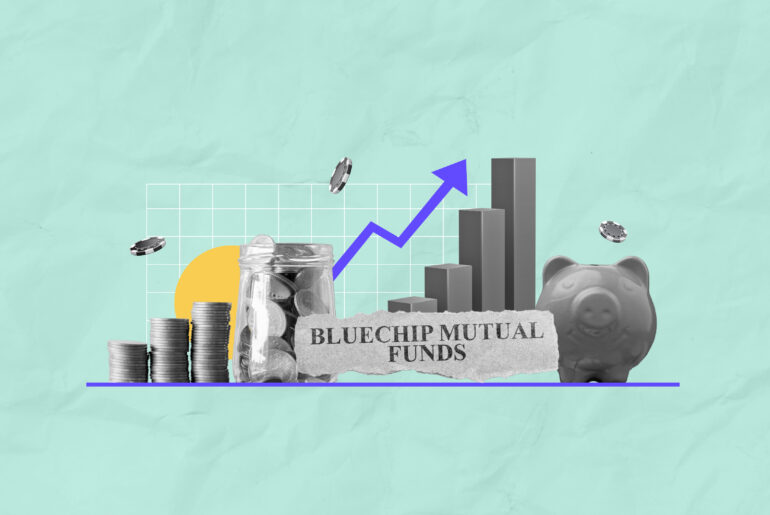Last Updated on Apr 18, 2023 by
A stock market is where participants buy and sell equity shares of companies. Traders and investors invest in the stock market to profit in the short or long term according to their needs and understanding of the market. However, the same stock market can be an intimidating place for newcomers.
Trading can now be easily done online, but many beginners know little about the stock markets. Nevertheless, to understand how the stock market works, one of the first things you need to understand is the basic terminology that is most commonly used in online trading.
In this article, learn about commonly used trading terminologies and their meaning so that you do not feel lost when you debut in the world of online trading.
Table of Contents
25 common terms used in online trading
It is very important for you to learn the basic online trading terms before you jump headfirst into the stock market. So here are some day-to-day jargons that you should be familiar with to navigate through the markets.
- Ask/Offer: The term ‘Ask’, also known as ‘Offer’, is the lowest price the owner of any equity shares asks for when they are selling their shares in the stock market.
- At the money: This is a situation in the stock market in which the stock price of any option is the same as the underlying securities market price. High options trading activity can be seen when ‘at the money’ options occur.
- Bear and bull market: The terms bull and bear market are often used in most articles related to the stock market. These terms are used to describe the current trend that can be seen in the stock market at that given time.
A downward trend or low mood in the market is known as a bear market. This means that the price of stocks is constantly falling. On the other hand, a bull market refers to an upward trend in the stock market, meaning the prices of the stocks are increasing. - Bid: This term is related to ask/offer. Basically, a bid refers to the amount of money any potential buyer is willing to pay for a share of any stock. If multiple buyers bid on the same stock, this will lead to a bidding war. The highest bidder will be able to buy the stock.
- Broker: A broker is a stock brokerage firm or person. They usually are the ones that buy and sell the stocks on behalf of the investor. The investors are their clients on whose behalf they actively buy and sell stocks according to need. The agent or the broker does not own any part of the share during the entire transaction.
- Call option: This is an offer that a buyer of an option gets. They get the right, without any obligation, to buy a particular asset within a particular time limit and with a set price.
- Close price: This is the final price at which any stock is traded or sold at the end of a trading day.
- Day trading: It is a practice of buying and selling a share on the same day before the market closes. Day trading is also known as intraday trading.
- Equity: This is one of the most common terms in online trading. ‘Equity’ refers to ownership. In other words, it refers to how many company shares are owned by an investor.
- Limit order: It is a type of order where you set a predetermined price to buy or sell a share. For example, if the current stock price is Rs. 100 and you set a limit order to buy it at Rs. 90, your order will be executed when the stock price touches Rs. 90.
- Lower circuit: It is the minimum price the stock can fall to in a single trading day. It is calculated based on the stock price of the previous day.
- Liquidity: It refers to the ability of the stock to be bought and sold quickly. High liquidity means there are a lot of buyers and sellers for the stock.
- Market order: It is an order to buy the stock immediately at the current market price.
- Open, low, high and close: Open and close refers to when the market is open and closed on a particular trading day. High and low refers to the stock price, that is, the highest and lowest prices of the stock on that particular day.
- Stop loss: It is a tool where the investor can limit their loss by exiting the market if the stock is moving away from its expected price. For example, if you bought a stock at Rs. 500 and want to set the loss at Rs. 450. You could place an order to sell the stock if it reaches Rs. 450.
- Spread: An ask-bid-spread refers to the difference in price that the seller asks for a stock and the price the buyer wants to pay. Often, the bidding price is lower than the asking price. The difference between these two prices is known as the spread.
- Stock and share: A share is a unit of the company, and when you buy it, you are known as the shareholder. While a stock is a collection of shares of a company.
- Short sell: It is an investment strategy of buying at low and selling at high. Traders don’t own these stocks; instead, they borrow from a broker or a dealer. If the stock price increases, the trader will gain; if the stock price goes down, it’s a loss for the trader.
- Trading account: A trading account is essential for anyone participating in online trading. It is an account that links an investor’s Demat and bank account. One can buy and sell shares at their will and speed through a trading account.
- Trading volume: As the name suggests, it is the number of shares traded on a particular day.
- Upper circuit: It is the opposite of the lower circuit. The upper circuit is the maximum price the stock can go up to in a single trading day.
- Volatility: It refers to fluctuations in the stock price. Stocks with high volatility have a lot of ups and downs in their prices. The opposite is true for low-volatility stocks.
- Yield: The end goal of anyone trading stocks is to get good returns. This is referred to as yield. This is calculated in percentage and refers to the return on a stock investment.
- 52-week low: It is the lowest price the stock has traded in the 52-week period, which is a year.
- 52-week high: It is the highest price the stock has traded in 52 weeks.
Why is it important to know online trading terminologies?
The first thing a person needs to do before getting into any form of investment is research. This holds true for the stock market and especially online trading. In online trading, people use jargon that newcomers or those unrelated to the stock market wouldn’t understand. These jargons are understandably very industry-specific and used by experienced traders regularly.
These terms are used to explain indices, stock market patterns, trading strategies, and much more. If you are new to the world of online trading and do not want to spend too much time looking up unfamiliar terms daily, you need to learn the terms and what they mean.
Conclusion
These are some of the most important terms you need to know when you plan to get into the world of online trading anytime soon. A stock market is an ever-changing place you must keep up with. If you are willing to take investing seriously, you should learn all the important jargon before diving into it.
Use Tickertape Stock Screener to analyse a stock better. There are over 200 filters that can help you list the best stocks according to your preferred parameters. Make use of it and make your investment journey easy.
FAQs
Can we buy multiple stocks at one time?
Yes. On Tickertape, you can buy multiple stocks at a time. Just add your preferred stocks to the Watchlist and buy them once as per your requirement. Before investing, ensure you understand stock market investments well and invest according to your investment objective and risk appetite.
How to check the performance of the stock I’ve bought?
You can use Tickertape Portfolio to check the performance of your stocks. You can quickly view your stocks and analyse their current performance.
- How To Withdraw Mutual Funds? - Jun 6, 2025
- Top Maternity Insurance With Low Waiting Periods - Jun 5, 2025
- ROE vs ROCE – What are the Differences? - Jun 5, 2025





